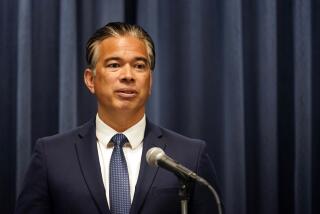5 Newport Partnerships Face Losses
Investors in five Newport Beach partnerships that promised to deliver profits by collecting delinquent credit-card debt now face losses up to $7 million, a new study shows.
An analysis by PricewaterhouseCoopers suggests that investors in the Performance Asset Management partnerships will recoup about 88 cents on the dollar of their original investment.
The study, commissioned by the court-appointed trustee who is overseeing the partnerships, is the first outside appraisal of the Newport Beach investment enterprise. It raises questions about whether the partnerships are as lucrative as previously claimed.
At stake is about $58 million from 2,500 investors--mostly well-off individuals and retirees--who were promised big profits by purchasing stakes in partnerships backed by pools of old credit card debt. Performance founder Vincent Galewick told investors that he would use their money to buy charged-off credit card debt for pennies on the dollar and then earn a profit by collecting the forgotten bills.
The partnerships filed for Chapter 11 bankruptcy reorganization Dec. 23 after state regulators sought to seize the operations, accusing Galewick of defrauding investors and violating state securities laws.
Galewick has denied the allegations and accused the California Department of Corporations of forcing him into bankruptcy and endangering investor funds.
A key dispute has been whether the debt portfolios--which have a face value of $2.3 billion--have been profitable. State regulators assert that investors will never get their money back because of the excessive fees that Galewick paid himself for running the operation. Galewick and his accountants insist that the debt portfolios are worth more than what investors paid.
James Joseph, the court-appointed bankruptcy trustee, hired PricewaterhouseCoopers to settle the debate.
The confidential report has not been filed in court, but the Times has learned that it estimates that future collections on the five debt portfolios have a current value of nearly $18 million.
But investors need about $25 million to get back their initial capital, not counting any profit or return. That leaves a $7-million shortfall.
State regulators said they are not surprised. “We said from the beginning that the assets were overvalued,” said Bill McDonald, chief of enforcement for the California Corporations Department. “That was part of the fraud.”
But attorneys for Galewick and investors cautioned that the PricewaterhouseCoopers study is only a rough estimate and that investors might earn more, depending upon how the company is reorganized.
“This isn’t the only alternative,” said Ron Rus, attorney for the investor committee and partner at Rus, Miliband, Williams & Smith in Irvine. “The committee is reviewing a variety of alternatives to ensure a maximum distribution to investors.”
An attorney for Galewick said the study was flawed and overly conservative. By improving collection efforts at Performance and increasing staffing levels, the eventual payout to investors likely will be higher than the PricewaterhouseCoopers estimate, according to William Lobel, partner at Lobel & Opera.
Experts in the debt collection business agree that appraising the value of bad debt portfolios can vary significantly depending upon the quality of the borrower data, how the collectors have treated borrowers in the past and what kind of discounts have been offered.
“Pricing at this level is much riskier and much harder,” said Manny Occiano, chief executive at Cypress Financial Corp., a rival debt collection company in Cypress.
Joseph did not return phone calls Wednesday seeking comment on the report.
In recent court papers, the trustee said that a reorganization of Performance--particularly one in which Galewick continued to play a role--would be “problematic” if it were determined that investors had lost money or failed to earn a profit.
In one bit of encouragement for investors, Joseph also reported that collections on the five portfolios have been yielding about $700,000 to $800,000 a month.
According to McDonald, the trustee must now weigh whether investors will earn more from liquidating the company or keeping it alive in hopes of collecting more profit down the road.
One option is selling the company or the debt portfolios to outside parties. Among those firms known to be interested in acquiring bad debt portfolios are Creditrust Inc., Capital One Financial Corp. and Providian Financial Corp.
Another interested buyer might be General Motors Acceptance Corp., the financing arm of the U.S. car-maker, which has expressed interest in purchasing some of the company’s collection-related software, according to Galewick.
More to Read
Inside the business of entertainment
The Wide Shot brings you news, analysis and insights on everything from streaming wars to production — and what it all means for the future.
You may occasionally receive promotional content from the Los Angeles Times.










